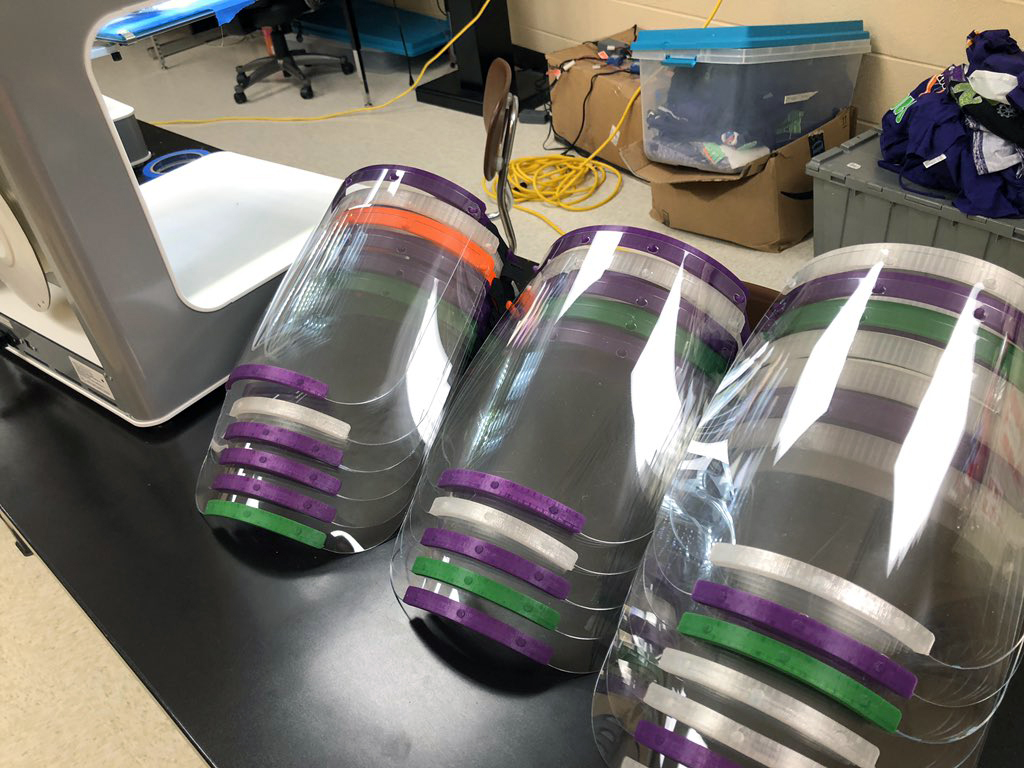Printing 3D equipment to fight COVID-19
High school students use MU eMINTS printers to make face shields for health care workers
With health care workers at the front lines of the coronavirus pandemic, the demand for personal protective equipment is at an all-time high.
To address this challenge, students at Camdenton High School are using 3D printers to help produce hundreds of face shields for health care workers at Lake Regional Hospital in Osage Beach, Missouri. The printers were provided by nearby Camdenton Middle School, which received them as part of a $16 million grant from the MU College of Education’s eMINTS National Center. The Camdenton R-III School District is a member of the Missouri Partnership for Educational Renewal.
“To see the face shields being used by medical professionals is encouraging and the reaction has been super positive,” said Zane Foulk, a senior at Camdenton High School and member of the Camdenton For Inspiration and Recognition of Science and Technology (FIRST) Robotics team. “We have been making roughly 40 face shields a day and will keep going until we run out of material or the hospitals get what they need.”

As COVID-19 continues to spread, what started as a simple ask from Lake Regional Hospital for 150 face shields quickly snowballed into additional requests from first responders, dentist offices and even U.S. troops serving overseas in Afghanistan.
“Our small, good intention turned into something much larger,” said Sherry Comer, who coaches the Camdenton LASER 3284 FIRST Robotics team and serves as the school district’s after-school director. “It’s been a collaborative effort, and the students were eager to jump at an opportunity to help the community.”

The grant project, which started in 2018, trains middle school teachers to incorporate technology, such as 3D printing, into their classrooms. Michelle Kendrick, program coordinator for eMINTS, Enhancing Missouri’s Instructional Networked Teaching Strategies, collaborated with Johannes Strobel, a professor in the School of Information Science & Learning Technologies, to partner with 27 middle schools throughout rural Missouri and Kansas.

“We are teaching students that they are not just consumers of new technologies, but they can use it to produce something that is helpful and can save lives,” Strobel said. “This is a time to organize and mobilize our resources to support the health care workers in our communities.”
Strobel has been working with 16 3D printers in the College of Education to prototype new designs and produce face shields locally for MU Health Care, Boone Hospital and nursing homes. He and Kendrick are working with the Department of Education to share the 3D printing experiences in Camdenton with other eMINTS partner middle schools throughout rural Missouri and Kansas. Printers for the project were provided by Kansas City Audio-Visual.
In addition, Kendrick and Strobel are developing curriculum for middle school teachers that highlight the coronavirus pandemic response in relation to its impact on science, technology, engineering and math (STEM), as well as skills like problem-solving, teamwork and empathy.
“By tying this health crisis into the students’ curriculum, they are able to see that the work they are doing with 3D printers is having an immediate and direct impact on a real-world situation,” Kendrick said. “In addition to sparking interest in science and making schoolwork more engaging, we hope this experience teaches young students about empathy by asking them to consider the needs of health care workers and the sacrifices they have made to protect us all.”
Funding for this project was provided by the eMINTS National Center and Kansas City Audio-Visual. The content is solely the responsibility of the authors and does not necessarily represent the official views of the funding agencies.